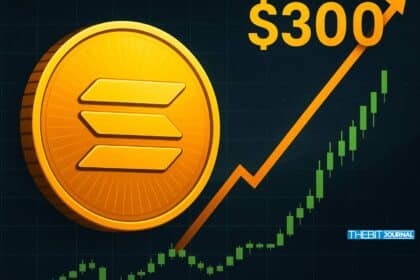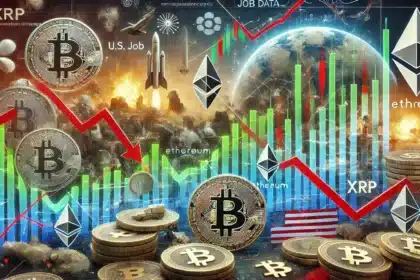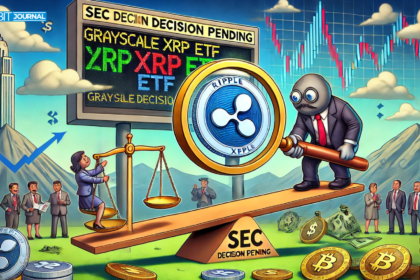President Donald Trump announced on April 2, 2025, the implementation of a universal 10% tariffs on all imported goods, with certain nations facing even steeper rates. This sweeping policy, effective April 5, aims to address longstanding trade imbalances but has ignited fierce debate among economists, business leaders, and policymakers.
The ramifications are being felt across various sectors, notably in the cryptocurrency market, where industry leaders suggest that such economic turbulence could drive increased interest in digital assets.
Immediate Market Reactions and Investor Concerns
The announcement of these tariffs precipitated a significant downturn in global stock markets. Major indices, including the S&P 500 and Dow Jones Industrial Average, experienced sharp declines, reflecting investor anxiety over potential trade wars and economic slowdown. The tech-heavy Nasdaq Composite also entered bear market territory, underscoring the widespread apprehension.
Economists warn that these protectionist measures could lead to higher consumer prices and disrupt international supply chains. Notably, hedge fund manager Bill Ackman voiced his concerns, stating,
“The president has an opportunity to call a 90-day time out,”
advocating for a pause to negotiate and resolve trade issues without causing major global economic disruption.

Cryptocurrency as a Safe Haven Amid Economic Uncertainty
Amid the financial market volatility, attention has turned to cryptocurrencies as potential safe-haven assets. Richard Teng, CEO of Binance, the world’s largest cryptocurrency exchange, suggested that the macroeconomic uncertainty induced by the tariffs might accelerate interest in digital assets.
In an April 8 post on X (formerly Twitter), Teng remarked that while the immediate reaction might be a “risk-off response,” the long-term effect could be increased attention toward cryptocurrencies as non-sovereign stores of value.
Diverse Perspectives on the Trump’s Tariff Strategy
The administration defends the tariff strategy as a necessary step to rectify trade imbalances and bolster domestic industries. President Trump emphasized that these measures are designed to protect American jobs and reduce the trade deficit.
However, critics argue that such broad tariffs may backfire, leading to retaliatory actions from trading partners and harming U.S. consumers with higher prices. Jamie Dimon, CEO of JPMorgan Chase, cautioned that the tariffs could heighten inflation and increase the likelihood of a recession.

Global Reactions and Potential for Retaliation
Internationally, the response has been swift and pointed. China, a primary target of the increased tariffs, has signaled potential countermeasures, raising fears of an escalating trade war.
The European Union has also expressed concerns, with officials contemplating responsive actions to protect their economic interests. Such retaliatory measures could further destabilize global markets and exacerbate economic tensions.
Conclusion
President Trump’s sweeping tariff policies have introduced significant volatility into global financial markets, eliciting a spectrum of reactions from economic leaders and policymakers.
While the administration views these measures as corrective actions to address trade imbalances, the immediate fallout suggests a period of economic uncertainty. In this climate, cryptocurrencies are emerging as potential safe-haven assets, offering an alternative to traditional financial instruments amid the turbulence.
As the situation unfolds, the interplay between protectionist trade policies and the evolving cryptocurrency landscape will be closely monitored by investors and analysts alike.
FAQs
What are the main objectives of President Trump’s tariff policies?
The administration aims to reduce trade deficits, protect domestic industries, and address what it perceives as unfair trade practices by imposing tariffs on imported goods.
How have global markets reacted to the announcement of these tariffs?
Global stock markets experienced significant declines, reflecting investor concerns over potential trade wars and economic slowdown.
Why are cryptocurrencies considered a safe haven during economic uncertainty?
Cryptocurrencies are decentralized and not directly tied to any single economy, making them appealing as alternative stores of value when traditional markets are volatile.
What potential retaliatory actions might other countries take in response to U.S. tariffs?
Affected countries may impose their own tariffs on U.S. exports, file disputes with international trade organizations, or seek new trade alliances to mitigate the impact.
Who is Richard Teng, and what is his perspective on the current economic situation?
Richard Teng is the CEO of Binance, a leading cryptocurrency exchange. He believes that the current macroeconomic uncertainty may accelerate interest in cryptocurrencies as alternative assets.
Glossary of Key Terms
Tariff: A tax imposed by a government on imported goods to protect domestic industries or generate revenue.
Bear Market: A market condition characterized by a prolonged decline in asset prices, typically defined as a 20% drop from recent highs.
Cryptocurrency: A digital or virtual currency that uses cryptography for security and operates independently of a central authority.
Trade Deficit: An economic condition where a country’s imports exceed its exports, resulting in a negative balance of trade.
Safe-Haven Asset: An investment that is expected to retain or increase in value during times of market turbulence.





























